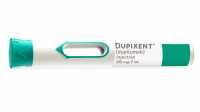Asthma, Author Interviews, NEJM, Pediatrics, Pulmonary Disease, Vanderbilt / 08.12.2021
NEJM: Dupilumab for Pediatric Uncontrolled Moderate-to-Severe Asthma
MedicalResearch.com Interview with:
Leonard B. Bacharier, MD
Janie Robinson and John Moore Lee Chair in Pediatrics
Professor of Pediatrics
Director - Center for Pediatric Asthma Research
Scientific Director - Center for Clinical and Translational Research
Section Chief - Pediatric Allergy and Immunology
Division of Allergy, Immunology and Pulmonary Medicine
Monroe Carell Jr. Children’s Hospital at Vanderbilt University Medical Center
MedicalResearch.com: What is the background for this study? Is Dupilumab used for other atopic conditions, ie eczema/atopic dermatitis?
Response: Many children with moderate-severe asthma continue to experience asthma exacerbations and poor asthma control despite use of controller therapies. Dupilumab has been shown to reduce asthma exacerbations in adolescents and adults, as well as to improve atopic dermatitis in children and adults. (more…)



